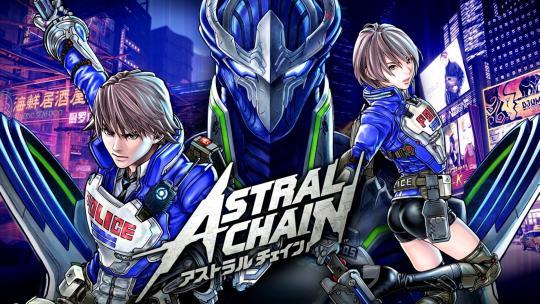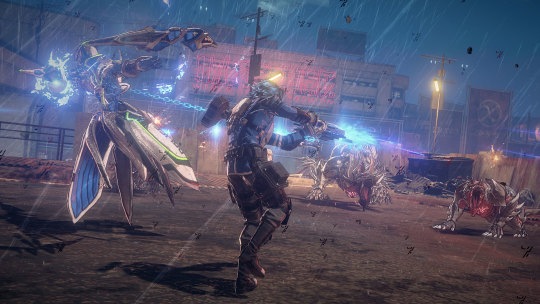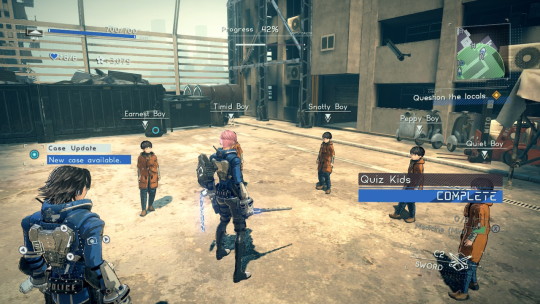#it has straight up been nonstop foe the last 2 day
Explore tagged Tumblr posts
Text
bro i can’t tell if i’m suffering from phantosmia or if i’m literally somehow smelling cigarette smoke coming from somewhere but it’s driving me INSANE
#it has straight up been nonstop foe the last 2 day#*for#except for when i went out to the store earlier??? which is why i’m questioning if it’s real#but i’ve had issues with this before in other places where apparently nobody else can smell anything#i hope to god i’m not going hypothyroid on these meds#idk bro. hallucination or not i need it to stop it’s making me SICK#rambles.
5 notes
·
View notes
Text
Astral Chain Review: Popo’s Bizarre Adventure

Life can be funny sometimes; I started out 2019 hoping that I could play a certain PlatinumGames-developed Switch exclusive, and while I did eventually get such a thing, it wasn’t Bayonetta 3, but instead Astral Chain. The last time Nintendo and PlatinumGames worked together on a brand new IP we got The Wonderful 101, one of my favorite games of all time, so I was pretty pumped about Astral Chain from moment one. A game where you control Stands like Jojo’s Bizarre Adventure, but you’re a hot anime cop! The kinda game you didn’t know you needed! Now that it’s finally here I can definitely say with confidence that I really love…like half of this game.
C.O.P.S: ANIME EDITION
The world of Astral Chain is in a bad way. Set in a future with Earth on the brink of collapse, most of the planet has been corrupted by the Astral Plain, an alternate dimension. With the remnants of humanity confined to a man-made island, an elite police force, Neuron, investigates the invisible cause of the world-ending corruption, Chimeras. Armed with enslaved Chimeras of their own, Legions, Neuron fights back against Chimera attacks, all the while searching for a way to save the world before its too late. Players take the role of a newcomer to Neuron, rising up the ranks alongside their twin sibling, mastering their Legion as various villainous factions seem intent on bringing about the end of the world.
I’ll be blunt here: Astral Chain’s story is passable, but didn’t do much for me. It’s not exactly bad, but predictable and doesn’t really take many risks. The game has an anime aesthetic, and in many cases seems more content with paying homage to various sci-fi anime than telling a unique story, so I’d say it’s quite by-the-numbers. That’s certainly fine, but what really shines in most Platinum titles are their larger-than-life characters, and I find them lacking here. Most of Neuron gets the shaft as time goes on, with only a scant few characters getting much development. Maybe I’m a tad spoiled by the likes of Fire Emblem: Three Houses, but the fact that so little of the incidental dialogue is voiced also keeps most of the Neuron officers from sticking out to me. Some characters, like Hal, Marie and Kyle, DO stand out and are pretty great, but that’s about it.

Thankfully, everything else about the game’s presentation is stylish. From the UI to the enemy intro cutscenes, to the sound design and battle animations, Astral Chain is a delight for the eyes and ears. The futuristic setting allows from some sleek visuals, and the lighting and particle effects stand out among most Switch titles. I’d daresay that at times, Astral Chain is Platinum’s best looking game. This does come at the cost of performance though. The game is locked to mostly 30 FPS, though you’ll see some dips in some frantic moments, but not too often. Resolution can also dip in some instances too, the performance at its worst in bigger areas with tons of NPCs around, but most combat sections cut down on clutter and the performance remains solid when you need it, so it mostly works out. Music’s also pretty stellar, and completes the anime-aesthetics with legit opening and ending themes too. Looks can only do so much though, but Platinum is never one to get by purely on outward appearances.
CHAIN PAIN
Combat is where Platinum shines, and that’s definitely true for Astral Chain, though you do have to wait a lot longer than usual to get a good feel for what the game’s trying to do. The first few hours leave a pretty bad first-impression honestly, with lackluster combat options and clunky movement, but once the game shows it’s hand everything starts to really click. By the endgame you’re drowning in options, to the point where it would have been overwhelming if the game threw it all at you right at the start. Best to ease players into the game, but it’s risky to not start the game off on the right foot.

The defining feature of this game is controlling two characters at once, your officer and their Legion. At the start, your officer’s options are limited, and Legions mostly attack on their own, but over time you gain more Legions to swap between on-the-fly, as well as more manual actions you can perform alongside them. Sync Attacks, for one, require you to tap the Legion button at specific points after attacks, which will have the two of you team up for big damage. Your officer gains a shape shifting “X-Baton” weapon that can take a few different forms to vary up their own combat, but the five Legions you gain are your most important tools. Sword, Arrow, Arm, Beast and Axe; each Legion has their own uses in and out of combat and in many cases feel like extended nods to Platinum’s entire back-catalog. Sword can enter Raiden’s Blade Mode from Metal Gear Rising: Revengeance to cut enemies on a specific axis, or sever connections between specific doors or objects. Arrow can take out enemies from afar, or be brought in for an over-the-shoulder shooting experience right out of Vanquish. Arm is like an extended nod to Jojo’s Bizarre Adventure, pounding foes with a flurry of punches, as well as being able to pick up and throw objects. Beast is just Bladewolf from Revengeance, letting players ride atop it for mobility, and digging up items or following scents like a real dog. Lastly, Axe is a powerhouse that also grants players a powerful barrier that can protect them from various hazards. Certain enemies require specific Legions to take out, and with all five at the press of a button, things can get hectic, but in a good way and advanced players can do a lot with all of these tools.
Each Legion has their own skill tree that can grant them special moves or increase stats as well, and similar to the chip system from Nier: Automata, players can equip special passive skills onto each Legion, provided they have enough slots open for them. The chain connecting officer and Legion also comes into play too, being able to move the Legion freely and bind enemies up (bringing Wonderful 101’s Wonder Liner to mind), or send a charging enemy flying back with an Irish Whip straight out of wrestling. Legions can’t stay out forever though, their Sync Gauge slowly draining as they fight, huge chunks of it taken out if they get hit by attacks, but it recharges pretty quickly, especially if your officer stays aggressive. Compared to past Platinum titles, there’s a lot more emphasis on using items and having “builds” when going into fights too. Healing items alongside combat-oriented items like drones or shields are encouraged rather than penalized, as is the standard. There’s more I could go into, but this hopefully gives you an idea of how much is going on in this game’s combat. Comparing the first few hours to endgame is night and day, more so than almost any other Platinum title.
Generally, the combat is up to the Platinum standard, but unlike most games by the developer, there’s actually a LOT of gameplay that isn’t straight combat, making this Platinum’s most varied game yet…for better or for worse.
STYLISH BUSYWORK
Here’s where things get kinda tricky. On the one hand, it’s good for a game to have at least SOME variety, right? If a game is nonstop action, it risks becoming stale, so having some slower moments makes the bigger moments more impactful. It’s a question of pacing more than anything else, and unfortunately the pacing in Astral Chain leaves a LOT to be desired.

To say it as succinctly as I can, the levels in Astral Chain drag on far too long. A typical level in Platinum’s catalog is roughly 20 minutes, give or take a bit of backtracking or some story bits. In Astral Chain, a full level, or “File”, can take four to five hours by comparison, and when you lay it out like that, you realize there’s an awful lot of filler to sift through to get to the good stuff. You have investigation sequences that are laughably easy for one. Using discount Detective Vision from the Batman Arkham games, you “find” clues and then fill in the blanks to form a lead, but these sequences are impossible to fail. Solutions are highlighted and even if you come to the wrong conclusion, the game will just correct you and you’ll move on regardless. Then you have platforming sequences that are mostly fine, though hampered by being unable to use the camera most of the time (since the right stick can also manually control your Legion). At times, honest-to-God sidequests can be found that are usually not combat-focused, and we can throw in some awful motion-controlled minigames for good measure. On their own, these extra bits aren’t too bad, kinda boring in some respects but otherwise fine, however for someone who just wants to progress the story and get to the next fight, they become barriers you’re forced to contend with before you can get back to having fun.
Now, a lot of this stuff IS optional, but you’re heavily encouraged to do them all anyway. You get locked out of getting good end-of-File ranks if you avoid optional ranked missions, and you’re given rewards for all of this stuff anyway. They’re mostly cosmetic rewards, but the game still seems to expect you to engage with this “extra” content…to the point that it’s clearly not seen as extra but a part of the whole Astral Chain experience. If you stripped out the non-combat portions, that’s like 2/3s of the game gone and it feels kinda messed up to skip out on so much of it. Rather…maybe the game should have made a point of having this stuff be engaging to do in its own right.
MAKING THE GRADE
I want to stress that there’s a lot I liked about Astral Chain. There’s plenty of charm hidden throughout here, and the prospect of a Platinum game that strives to do MORE isn’t a bad one. I enjoyed having NPCs to talk to, larger areas to explore that weren’t just combat areas, and little touches like getting points for recycling or being unable to jaywalk were appreciated. One thing I never touched on was its ranking system, which seems more emblematic of the issues I had with the game. Rather than rewarding and ranking one’s own play, it awards high ranks more so for variety than anything else. It doesn’t matter how poorly you play (to a point), as long as you do a lot of different stuff it’ll all work out. Thus, the game threw a lot of stuff at the wall regardless of how hard it stuck, and as such there’s a number of great ideas mixed in with some really, really weird ones.
Astral Chain is in many ways an experimental game for Platinum. They seem to be trying to move away from niche action games and offer up more for the consumer, but in doing so I fear they might be diluting their games. I’ve been quite a bit more critical of this game than I expected to be, and in the end I’m more just bummed that I didn’t enjoy it more. This game is the directorial debut of Takahisa Taura, and I can practically feel the passion he had for this product; he likely loaded this game with a lot of things that he personally liked, and it’s clear everyone involved worked hard to deliver the best game they could. The results vary a bit, as we have crisp visuals and unique, deep combat mixed in with some plodding segments that seem thrown in for variety’s sake. Astral Chain is ambitious, but maybe this once Platinum bit off a bit more than they could chew. I’d also petition that this game is a victim of certain expectations of what I think a PlatinumGames title “should” be. It’s possible Taura felt pressured to put in aspects of Platinum’s past output and was afraid to go further and make this game truly something new. I’ll also wager that if Astral Chain is someone’s first Platinum game, they’ll be able to come in with a fresher perspective and might end up enjoying it more than a diehard fan like me. There’s a solid foundation here for any future titles though, and I think this game’s issues could be ironed out if given the chance. At its height, the combat really sells this game for me, and action fans will find a lot to love…but there’s a lot in here that might not scratch that particular itch. I wouldn’t quite call this game the weakest link in PlatinumGames’ chain at any rate, and I remain a fan of the company and their future output.
Shine on Platinum.
-B
#astralchain#Astral Chain#platinumgames#bayonetta#wonderful101#nintendo switch#action girls#blue beetle#xb-squaredx
7 notes
·
View notes